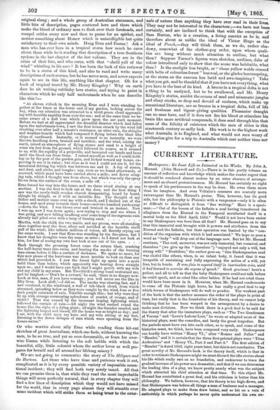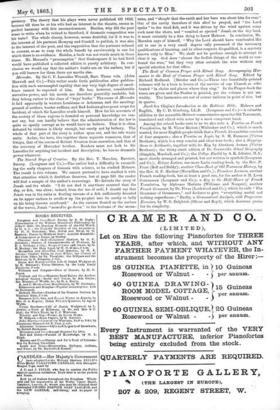CURRENT LITE RAT [IRE.
Shakespeare : his Inner Life as Intimated in his Works. By John A. Heraud. (John Maxwell and Co.)—There is in this portly volume an amount of reflection and knowledge which makes the reader regret that it should be rendered almost useless by an utter absence of arrange- ment and an absurd pretentiousness. Mr. Reread has certainly no right to speak of his predecessors in the way he does. He owes them more than he imagines. And even Voltaire's censures are scarcely more extravagant than Mr. Heraud's praise. This, however, has its good side, but the philosophy is Platonic with a vengeance—only it is often so difficult to distinguish it from "fine writing." Here is a speci- men:—" Out of the bosom of the Infinite a soul having transferred ita allegiance from the Eternal to the Temporal manifested itself in a mortal body on the 23rd April, 1564." Would it not have been easier to say Shakespeare was born than all that? Mr. Heraud goes on to say that this immortal soul brought with it powers and attributes from the Eternal and the Infinite, but their operation was limited by the "con- dition of the organism with which it had associated." We hope so poor a word as " body " will drop out of the language now. But let Mr. Heraud continue, "The soul, moreover, was not only immortal, but cosmical, and therefore " (we give up the "therefore ") "enjoyed not only a will, but strong will" "Doubtless," the author goes on, "this Shakespearian soul was chafed like others, when, in an infant body, it found that it was incapable of sustaining and folly expressing the action of a will, yet free, but in bonds. It was fain to expend itself in inarticulate cries, until it had learned to exercise the organs of speech." Good gracious ! here's a pother, and all to tell us that the baby Shakespeare could not talk before he could speak, and so cried like other babies. If he had not cried there would have been more in it. However, when Mr. Heraud condescends to come off the Platonic high horse, he has really a good deal to say which lovers of Shakespeare will do well to ponder. The weakest part of the book is that the author assumes the order of the plays in point of time, but really that is the foundation of his theory, and we cannot help thinking that he has been warped in the arrangement by a desire to make neat divisions. Now we think there is a good deal to be said for the theory that after the immature plays, such as "The Two Gentlemen of Verona" and "Love's Labour Lost," he wrote or adapted most of the historical plays, next the comedies, and lastly the great tragedies. But the periods must have run into each other, so to speak, and some of the histories must, we think, have been composed very early. Shakespeare can hardly have written "Henry VI.," after "Romeo and Juliet" and "Hamlet," and it is certain that the three first printed plays were "Titus Andronicus" and "Henry VI., Part 2 and Part 3." The first edition of " Hamlet " is dated 1603, eight years later, but this is not conclusive. The great novelty of Mr. Heraud's book is the theory itself, which is that in order to estimate Shakespeare aright we must discard the idle stories about his life which really rest on no foundation, and endeavour to trace the gradual increase of his power as a dramatist ; and that if we can determine the leading idea of a play, we know pretty nearly what was the subject which attracted his chief attention at that time. To this object Mr. Heraud has contributed a great deal, and his criticism is better than his philosophy. We believe, however, that his theory is too high-flown, and that Shakespeare was before all things a man of business and a manager. He adapted plays to make them draw better, and so hit on a vein of authorship in which perhaps he never quite understood his own su-
preznacy. The theory that his plays were never published till 1623; because till then he or his wife had an interest in the theatre, seems in perfect harmony with this unconsciousness. Besides, why did the poet cease to write when he retired to Stratford, if dramatic composition was his taste? The whole theory, however, seems doubtful, for if it was to the interest of his partners Hemyng and Condell to publish, it was also to the interest of the poet, and the supposition that the partners refused to consent, so ,as to reap the whole benefit by survivorship is one for which there is no evidence. Besides, a book was not worth much in those times. Mr. Heraud's "presumption" that Shakespeare if he had lived would have published a collected edition is purely arbitrary. In con- clusion we would say that the author's faults are on the surface, but if you will burrow for them there are merits also.































 Previous page
Previous page